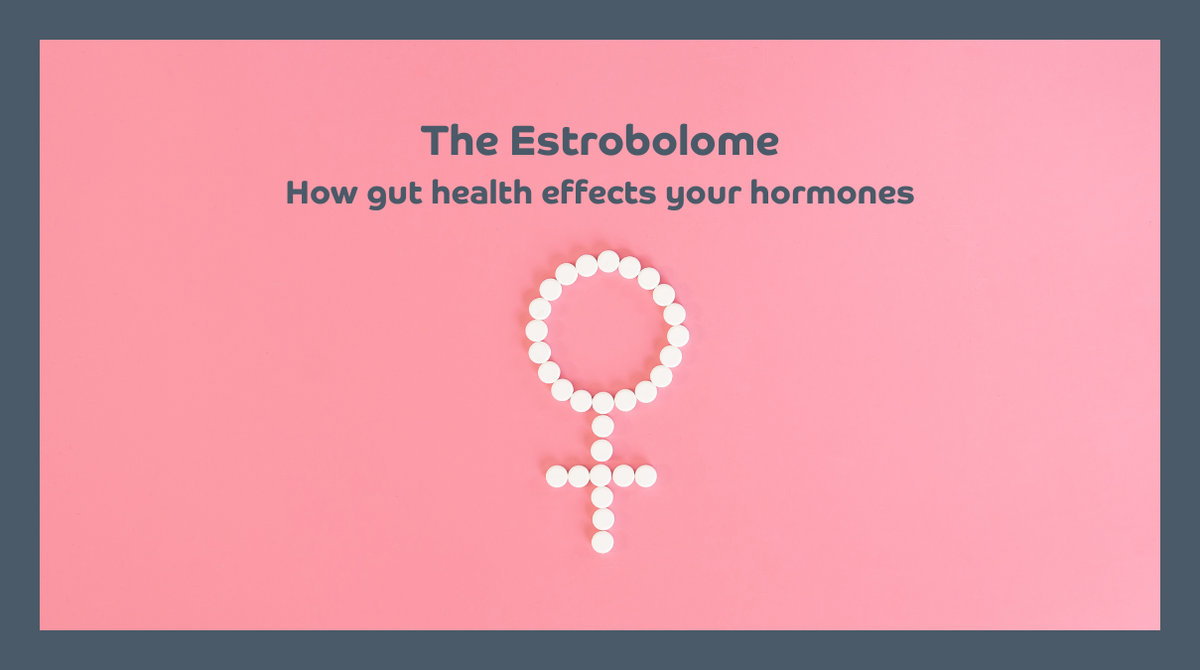Stress and the gut microbiome
When considering how to support hormonal health it might not typically be associated with gut health. However, the gut has a significant influence over the endocrine system - the glands that secrete hormones to manage and direct multiple biochemical processes. The gut and its resident trillions of microbes have the ability to exert authority over a whole range of hormones that relate to appetite, blood sugar levels, metabolism and even linked to fertility and hormonal changes like the menopause. Therefore, shaping the microbiome and supporting the gut can help hormone regulation and the subsequent implications of this on various aspects of health.
Gut health is particularly important in the case of the hormone oestrogen which is a steroid hormone influencing several key functions in the human body (of both sexes)to include fertility, bone health, cognitive health, cardiovascular health, metabolism and libido. An imbalance of oestrogen, either too high or too low, can lead to a wide range of health conditions including osteoporosis, anxiety and depression, infertility, irregular and/or heavy menstrual cycles, weight gain and has even been linked to certain types of cancer.
Optimising the functioning of the gut is critical for supporting hormonal health as the gut microbiome influences various functions that maintain hormonal balance, particularly in relation to the regulation of oestrogen levels. Specifically, a specialised collection of gut microbes referred to as the 'estrobolome', play a significant role in metabolising and eliminating oestrogen from the body.
Oestrogen is mostly metabolised in the liver which is then conjugated and transported via bile into the gut ready for elimination. The microbes of the estrobolome synthesise beta-glucuronidase, an enzyme with several important functions, one of which is to prevent reabsorption of oestrogen and facilitate its removal in order to maintain stable levels of oestrogen and thus hormone balance. This enzyme is also responsible for the conversion of oestrogen from its inactive to active forms, a process which can be disrupted by dysbiosis. Imbalances in the gut microbiome can therefore affect beta-glucuronidase activity which will then have an impact on the regulation of oestrogen levels, potentially leading to hypoestrogenic (e.g. metabolic syndrome) or hyperestrogenic (e.g. endometriosis) pathologies.
It is therefore important to maintain good gastrointestinal functioning in order to support a healthy estrobolome and hence facilitate hormone balance. This can often be achieved through following a healthy diet and lifestyle. Healthcare professionals could therefore consider advising their patients of the following:
• Fibre intake - Advise clients/patients to aim to achieve the recommended daily intake of fibre (30g) through a variety of sources in order to support gastrointestinal health and the estrobolome. In addition, including cruciferous vegetables such as broccoli, cauliflower, cabbage, kale, radish, turnip and Brussels sprouts in their diet, can help to further support oestrogen metabolism since they contain a specific compound called Indole-3-carbinol (I3C).
• Estrobolome support – Consuming prebiotics can help to maintain good microbial balance within the gut by acting as a substrate for beneficial bacteria. Examples of prebiotic foods include garlic, onions, leeks, asparagus, oats and pistachios. However, it can be challenging to consume the volume necessary in order to achieve a functional benefit and in some cases plant-based prebiotics can exacerbate gastrointestinal symptoms. Science-backed prebiotic supplements such as Bimuno can therefore be a useful alternative.
• Mindful drinking - Alcohol has a negative impact on the gut microbiome and crucially it also impairs the liver and its ability to detoxify hormones like oestrogen. Considering this, it's important to recommend moderation as a means of supporting a healthy hormone balance among patients/ clients.
• Exercise - Exercise or visiting the sauna can be a way of supporting internal detoxification processes, including hormone balancing. Exercise does not need to be intense in order to be effective. In fact, excessive intense cardiovascular exercise can increase cortisol levels which can have a negative effect on sex hormones. Conversely, yoga can be beneficial as it helps to support the parasympathetic nervous system which is conducive to reducing stress.
REFERENCES
Baker JM, Al-Nakkash L, Herbst-Kralovetz MM. Estrogen-gut microbiome axis: Physiological and clinical implications. Maturitas. 2017 Sep;103:45-53. doi: 10.1016/j.maturitas.2017.06.025. Epub 2017 Jun 23. PMID: 28778332.
Filippone A, Rossi C, Rossi MM, Di Micco A, Maggiore C, Forcina L, Natale M, Costantini L, Merendino N, Di Leone A, Franceschini G, Masetti R, Magno S. Endocrine Disruptors in Food, Estrobolome and Breast Cancer. J Clin Med. 2023 Apr 27;12(9):3158. doi: 10.3390/jcm12093158. PMID: 37176599; PMCID: PMC10178963.
Hackney AC, Lane AR. Exercise and the Regulation of Endocrine Hormones. Prog Mol Biol Transl Sci. 2015;135:293-311. doi: 10.1016/bs.pmbts.2015.07.001. Epub 2015 Aug 5. PMID: 26477919.
Holscher H. (2017) ‘Dietary fiber and prebiotics and the gastrointestinal microbiota’ Gut Microbes. 2017 Mar 4;8(2):172-184. doi: 10.1080/19490976.2017.1290756. Epub 2017 Feb 6. (Online). Available at https://pubmed.ncbi.nlm.nih.gov/28165863/
Kumar J, Rani K, Chander D. (2020) ‘Molecular link between dietary fibre, gut microbiota and health’ Mol Biol Rep. 2020 Aug;47(8):6229-6237. doi: 10.1007/s11033-020-05611-3. Epub 2020 Jul 4. (Online). Available at https://pubmed.ncbi.nlm.nih.gov/32623619/
Leeuwendaal NK, Stanton C, O’Toole PW, Beresford TP (2022) ‘Fermented Foods, Health and the Gut Microbiome’ Nutrients. 2022 Apr 6;14(7):1527. doi: 10.3390/nu14071527. (Online). Available at https://pubmed.ncbi.nlm.nih.gov/35406140/
McDonald, D et al (2018) ‘American Gut: an Open Platform for Citizen Science Microbiome Research’ mSystems, 3(3), e00031-18. (Online). Available at https://doi.org/10.1128/mSystems.00031-18
Pohl K, Moodley P, Dhanda AD. Alcohol's Impact on the Gut and Liver. Nutrients. 2021 Sep 11;13(9):3170. doi: 10.3390/nu13093170. PMID: 34579046; PMCID: PMC8472839.
Wozniak M, Murias M. Ksenoestrogeny: substancje zakłócajace funkcjonowanie układu hormonalnego [Xenoestrogens: endocrine disrupting compounds]. Ginekol Pol. 2008 Nov;79(11):785-90. Polish. PMID: 19140503.
Baker, J. M., Al-Nakkash, L., & Herbst-Kralovetz, M. M. (2017). Estrogen-gut microbiome axis: Physiological and clinical implications. Maturitas, 103, 45–53. https://doi.org/10.1016/j.maturitas.2017.06.025
